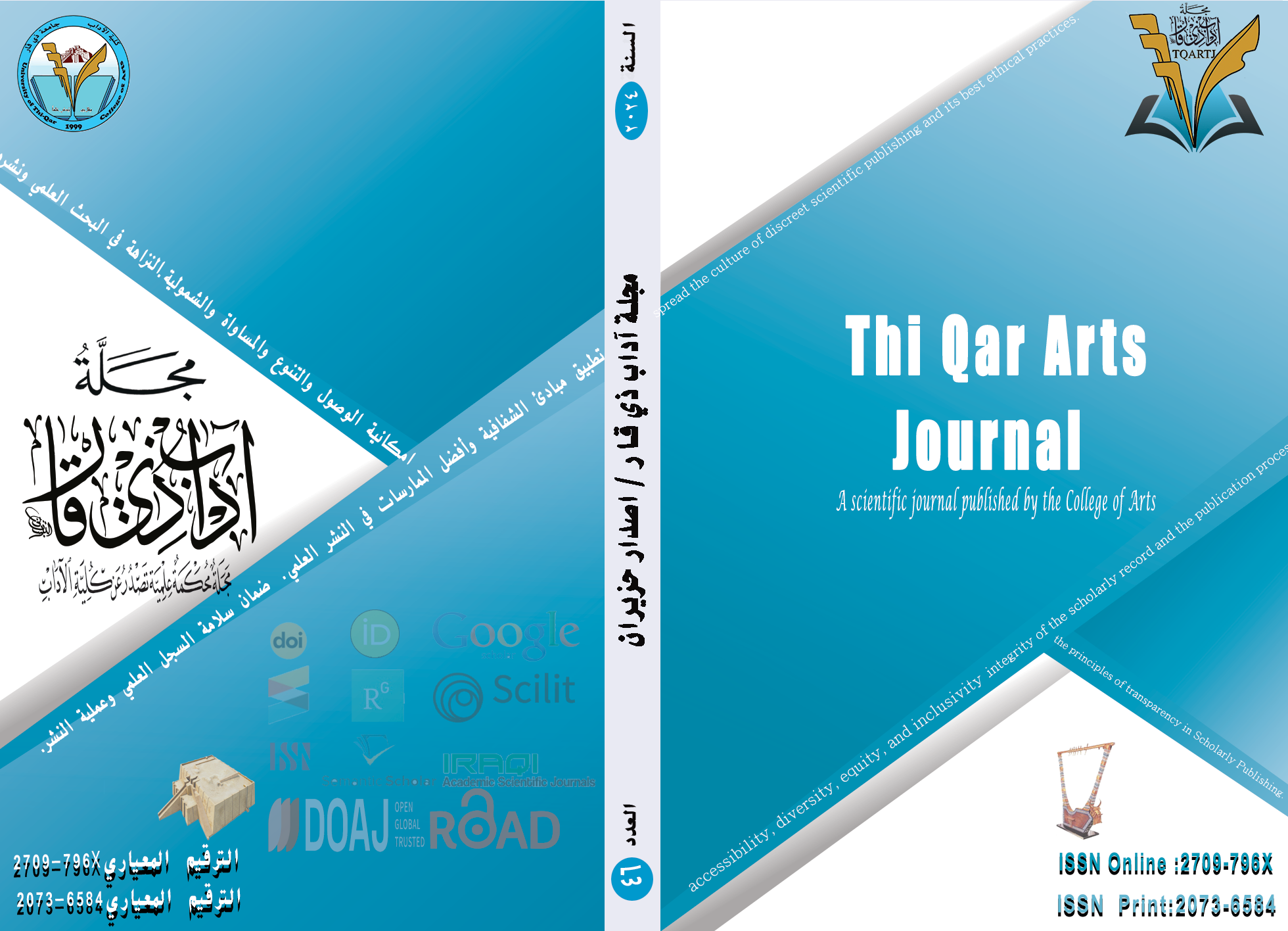Dialogue and its functions in pre-Islamic poetry
DOI:
https://doi.org/10.32792/tqartj.v4i46.620Keywords:
Dialogue, pre-Islamic poetry, monologue, dialogue with oneself, dialogue with the other, purposes of dialogue.Abstract
Dialogue in literature is a written or spoken exchange between two or more characters. It is a form of communication that allows characters to express their needs, desires, inclinations, attitudes, and problems. Dialogue has been known since ancient times as a necessity for human interaction. It was used in pre-Islamic poetry, giving poetic texts artistic value. In this article, we aim to shed light on dialogue in pre-Islamic poetry through an analytical critical approach.
Dialogue in Pre-Islamic Poetry: Dialogue was prevalent in pre-Islamic poetry, often used to express sorrow, grief, and emotions by various poets. Notable examples include:
- Imru’ al-Qais in his dialogues with his beloveds, Salma and Layla.
- Zuhayr ibn Abi Sulma in his dialogue with Umm Awfa.
- Amr ibn Kulthum, Tarafa ibn al-Abd, and Al-Harith ibn Hilliza al-Yashkuri in their dialogues with their tribes.
Different types of dialogue appeared, such as:
- Monologic Dialogue: A conversation with oneself.
- Self-Dialogue: Reflecting internal thoughts.
- Supplicatory Dialogue: Addressing a higher power or oneself.
- Dialogue with Others: Interacting with other characters.
The purposes of these dialogues varied, including expressing love for the beloved, longing for the homeland, or raising awareness among people. The dialogues were characterized by pride in the poetry of Amr ibn Kulthum, sorrow in the poetry of Tarafa ibn al-Abd, and wisdom in the poetry of Al-Harith ibn Hilliza.
Downloads
References
References :
The Holy Quran
Abu Amr Al-Shaibani, Explanation of the Nine Mu’allaqat, edited by Abdul Hamid Hamo, Al-Alami Foundation for Publications, Beirut, Lebanon, 1st edition, 2001.
Ismail, Ezzedine, Contemporary Arabic Poetry, Dar Al-Rouda, Beirut, 1st edition, 1981.
Earl, Leon, The Psychological Story, translated by Mahmoud Al-Samra, Al-Ahliya Library, Beirut, 1959.
Badi Yaqub, Emil, Diwan of Al-Harith ibn Hilliza Al-Yashkuri, collected, edited, and explained by Dr. Dar Al-Kitab Al-Arabi, 2nd edition, Beirut, 1996.
Belkacem Khammar, Muhammad, Dialogue from the Self, Publications of the Arab Writers Union, Damascus, no edition, 2000.
Bou Juma, Bou Biaio, The Dialectic of Values in Pre-Islamic Poetry: A Contemporary Critical Vision, Publications of the Arab Writers Union, Damascus, no edition, 2001.
Todorov, Tzvetan, Mikhail Bakhtin: The Dialogic Principle, translated by Fakhri Saleh, Arab Library Forums, Beirut, 2nd edition, 1997.
Genette, Gérard, Introduction to the Paratext, translated by Abdul Rahman Ayoub, Cultural Affairs Department, Baghdad, 1985.
Khidr Hamad, Abdullah, The Seven Mu’allaqat - A Stylistic Study, Dar Al-Qalam, Beirut, no date.
Al-Hakim, Tawfiq, The Art of Literature, Al-Adab Library, Cairo, no date.
Hussein, Khreis, The Movement of Abbasid Poetry in the Field of Tradition between Abu Nuwas and His Contemporaries, Dar Al-Bashir, Amman, 1st edition, vol. 2, 1994.
Al-Raghib Al-Isfahani, Al-Mufradat fi Gharib Al-Quran, edited by Sayed Kilani, Dar Al-Maarifa, Beirut, no date.
Zaytouni, Latif, Dictionary of Narrative Criticism Terms, Dar Al-Nahar Publishing, Lebanon, 1st edition, 2001.
Saleh Nafi, Abdul Fattah, Dialogue in the Love Poetry of Omar ibn Abi Rabia, Arab Distribution and Publishing Agency, Amman, 1984.
Al-Sadiq, Qasouma, Methods of Analyzing the Story, Dar Al-Janoub, Tunisia, no edition, no date.
Al-Abadi, Issa Qweider, Patterns of Dialogue in the Poetry of Mahmoud Darwish, Journal of Social and Human Sciences Studies, issue 4, vol. 41, 2014.
Abdul Hassan Abdul Azim, Rasha, The Self and the Other in the Poetry of Abdul Wahab Al-Bayati, Master’s Thesis in Language and Literature, University of Al-Qadisiyah, Republic of Iraq, 2013.
Abdul Karim Al-Najm, Ziad, Dialogue and the Problematic Relationship between the Self and the Other, Al-Maarifa Magazine, Damascus, issue 535, 2008.
Abdul Nour, Jabbour, Literary Dictionary, Dar Al-Ilm Lilmalayin, Beirut, 2nd edition, 1948.
Aloush, Saeed, Dictionary of Contemporary Literary Terms, Dar Al-Kitab Al-Lubnani, Beirut, 1st edition, 1985.
Ali Abdullah, Dua, The Dramatic Structure in the Poetry of Muhammad Al-Qaisi, Dar Al-Ghaida, Amman, Jordan, 1st edition, 2016.
Al-Alqami, Ahmed Hassan, The Use of Dialogue in the Poetry of Qais ibn Al-Mulawwah (A Descriptive Analytical Study), Journal of the Arabian Peninsula Center for Educational and Human Research, vol. 2, issue 15, Jumada Al-Akhirah, 2022.
Al-Fayez, Abdul Rahman bin Abdul Aziz, Dialogue in Arabic Poetry until the End of the Umayyad Era (A Rhetorical Critical Study), PhD Thesis, Imam Muhammad bin Saud Islamic University, 2000.
Fatah, Abdul Salam, Narrative Dialogue: Techniques and Narrative Relations, Arab Studies and Publishing Foundation, 1999.
Farhat, Osama, Monologue between Drama and Poetry, Egyptian General Book Organization, Cairo, 1st edition, 1997.
Fahmy Maher, Hassan, Issues in Literature and Criticism, Dar Al-Thaqafa, Doha, 1986.
Faisal, Shukri, The Evolution of Love Poetry between the Jahiliyyah and Islam from Imru’ al-Qais to Ibn Rabia, Damascus University Press, no edition, 1959.
Mahmoud Younis, Sahira, Dialogue in the Poetry of Abu Firas Al-Hamdani (An Analytical Study), published research in the Journal of Basic Education College Research, University of Mosul, vol. 3, issue 3.
Hans Robert Jauss, Aesthetic Reception for a New Interpretation of the Literary Text, translated by Rashid Bin Jaddou, Beirut, 1st edition, 2016.
Hasis, Ali, The Face of Al-Hutay’ah: Mirrors of Accusation and Innocence, Dar Alam Al-Thaqafa for Publishing and Distribution, 2010.
Humphrey, Robert, Stream of Consciousness in the Modern Novel, translated by Mahmoud Al-Rubaie, Dar Al-Maarif, Cairo, 1975.
Yaqtin, Saad, Analysis of Narrative Discourse, Arab Cultural Center, 1st edition, Beirut, Casablanca, 1989, pp. 194-195.
Downloads
Published
License
Copyright (c) 2024 Dr. Maryam Hekmat Nia , Hussein Tatbard. Firouzjai , Zainab Kazem Attia

This work is licensed under a Creative Commons Attribution 4.0 International License.
The journal applies the license of CC BY (a Creative Commons Attribution International license). This license allows authors to keep ownership of the copyright of their papers. But this license permits any user to download, print out, extract, reuse, archive, and distribute the article, so long as appropriate credit is given to the authors and the source of the work. The license ensures that the article will be available as widely as possible and that the article can be included in any scientific archive.















